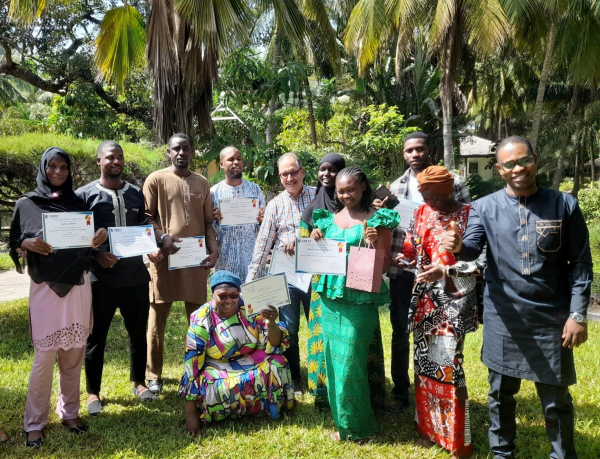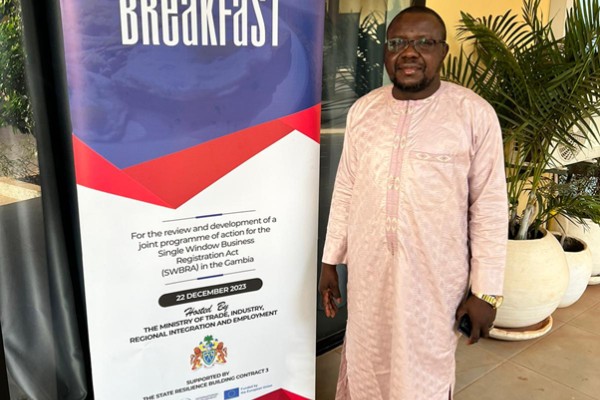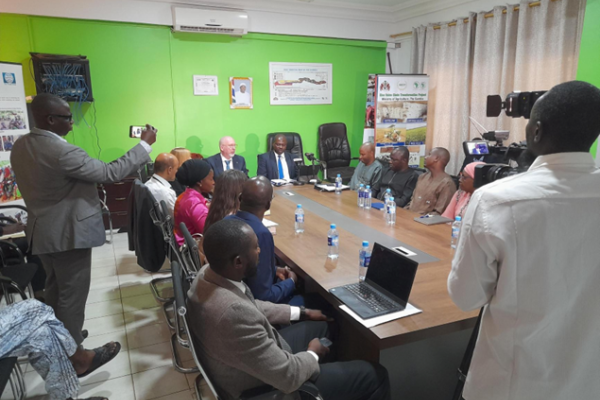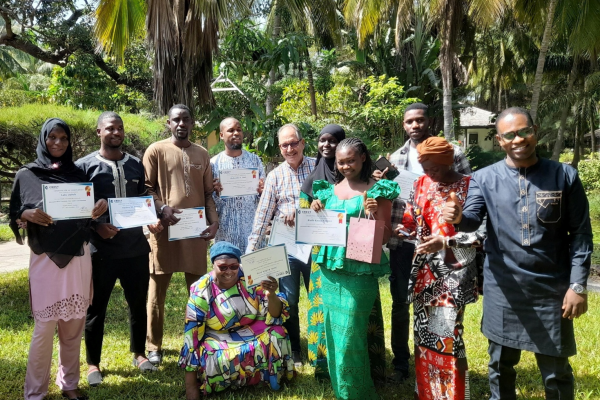Technical Assistance in support of the State and Resilience Building Contract 3, The Gambia
2022 - 2024
Technical Assistance in support of the State and Resilience Building Contract 3, The Gambia was a contract implemented by the Governance division at Landell Mills, in partnership with International Development Ireland (IDI), from 2022-2024.

The aim of the contract was to contribute to sustainable inclusive growth, and democratic and economic governance, in The Gambia to achieve key priorities in areas including economic recovery; transition to civilian democracy; and inclusive, accountable and responsive governance systems set by the government.
Across the duration of the contract, Landell Mills provided technical assistance to government departments and ministries in the project’s areas of interest, which included:
- Designing and implementing training courses.
- Assisting with policy design and implementation.
- Supporting communication and public diplomacy actions.
- Organising stakeholder workshops, regional conferences and study tours.
An overarching priority of the contract was to support The Gambia’s National Development Plan (NDP) and reform agenda, following the unseating of Yahya Jammeh in December 2016 after 22 years of authoritarian rule as president.
Read on to discover the support provided by Landell Mills under five main components.
Component 1: Public financial management and procurement
Activities under the public financial management and procurement component of the contract focused on strengthening the institutional capacity of various departments at the Ministry of Finance and Economic Affairs (MoFEA) to enable staff to lead and coordinate public financial management reforms for more efficient and accountable use of public funds, and effective public service delivery.
Component spotlight: Integrating the NDP into the national budget through the adoption of Program-Based Budgeting (PBB)
The current budgeting system in The Gambia is primarily input-based, focusing on line items such as commodities and expenditures. While this allows for the tracking of inputs – for example, the amount of fuel purchased – it does not provide information on the purpose or outcomes associated with those expenditures. As a result, it is difficult to assess the extent to which government goals and objectives are being achieved.
PBB addresses this difficulty by aligning budget planning and decision-making with intended results, rather than inputs alone. Within the Directorate of Budget at the MoFEA, this approach is referred to as performance budgeting, emphasising the allocation of resources to clearly defined programs, projects and activities, each with measurable outcomes.
Through ongoing technical support and a series of programmes and workshops, Landell Mills facilitated the use of PBB by all staff from government departments, ministries and agencies in The Gambia, which led to:
- An improved understanding of the process and output of PBB.
- Collaboration between the Directorate of Planning and Information and the Directorate of Budget at the MoFEA, enabling implementation through the entire budget cycle.
- Codification of the NDP, allowing for a traceable format for planning, funding and monitoring of programs, projects and activities (and accompanying funds) in the implementation of the NDP. This also included the upgrading of the Integrated Financial Management Information System to track expenditures against NDP achievement progress.
- Improved PBB design based on models currently in use by both local and national governments.
Although there is much progress still to be made, the 2025 budget cycle marked the first comprehensive application of the PBB format during budget bilaterals with government departments, ministries and agencies. Additionally, a model PBB framework statement and a PBB manual was developed for future use.
Component 2: Statistics
Landell Mills supported The Gambia Bureau of Statistics (GBoS) to conduct effective data collection with an aim to enable the government to make informed decisions, allocate resources efficiently and develop policies that accurately address the needs of the population.
Component spotlight: Supporting the design, implementation and review of the Gambia Labour Force Survey 2022-2023
Landell Mills provided technical assistance at each stage of the Gambia Labour Force Survey 2022-2023 to ensure full alignment with definitions and recommendations from the International Labour Organization. This included:
- Providing training on data editing, processing and computation, as well as developing a guide on the computation and derivation of key labour market and child labour indicators.
- Supporting the data analysis phase of the survey, including drafting the outline of the report to train GBoS staff in the production of labour statistics required for policy development.
- Producing a guide on analysis of labour statistics and presentation of results, which addressed weaknesses identified during implementation of the survey in terms of survey analysis, report writing and data visualisation.
The survey fieldwork was carried out from January-March 2023, with the sample consisting of 6,595 households and 48,300 individuals. Initial results were released in mid-July with the final results following in August 2023. The report – as well as the dataset, questionnaire and metadata – were published on the GBoS website. The time lag between data collection and dissemination of results was in line with international standards.
To support future household survey operations by the GBoS, the project funded the participation of the Director of Coordination, Statistical Methods, Quality Assurance & Dissemination at GBoS in the 21st International Conference of Labour Statisticians in October 2023, which is held every five years to review and update existing standards. The questionnaire for the Gambia Labour Force Survey was revised to reflect updated standards as a result of the Director’s participation in the conference.
Contributed to various areas in The Gambia
Including sustainable inclusive growth, and democratic and economic governance
Supported multiple government departments and ministries
To achieve key priorities including economic recovery and transition to civilian democracy
Provided a range of technical assistance under five main components
Including public financial management and procurement, statistics, business environment and private sector development, democratic reforms, and anti-corruption

Component 3: Business environment and private sector development
The business environment in The Gambia remains severely constrained by a combination of factors, such as overwhelming business regulations and tax burdens, poor infrastructure, and high levels of corruption. The purpose of this project component was to support the establishment of an improved business environment to promote investment and private sector development, by supporting relevant policies and reforms.
Component spotlight: Promoting intra-government dialogue on business environment and private sector development reform
One aspect of this project component involved the organisation of workshops that aimed to review the impact and effectiveness of special investment certificates on revenue collection and investment promotion, resolve challenges faced by business operators, and formulate national policies and strategies to ease business administration.
Landell Mills also facilitated intra-government dialogue on important business environment and private sector development reforms and initiatives. For example, the Ministry of Trade, Industry, Regional Integration & Employment; the Ministry of Finance; and the Ministry of Justice met to develop an action plan for the Single Window Business Registration Act, which streamlines the process of starting a business by consolidating multiple registration steps into a single platform – thereby reducing bureaucracy and promoting private sector growth.
A major milestone was achieved in The Gambia in February 2024, when the President chaired a National Business Council meeting. Various issues concerning business environment and private sector development were raised with the President and, in response, five commitments were made which will drive future progress in this area. The commitments made by the President were:
- Easing procedures for starting and running a business.
- Reviewing, reducing and rationalising business operating costs such as taxes, levies and charges.
- Improving access to business finance.
- Identifying and accessing land for investment.
- Investing in infrastructure development.
Component 4: Democratic reforms
This broad project component covered a wide range of technical areas, including human rights, security sector reform, transitional justice, civil society support and women’s empowerment.
Component spotlight: Supporting the implementation and monitoring of the Truth, Reconciliation and Reparations Commission (TRRC) recommendations
The Gambia’s TRRC process – established by national legislation in December 2017 and operational from October 2018 – involved the undertaking of extensive public hearings, the collection of testimony from over 400 witnesses and the production of a 17‑volume final report with 218 recommendations. The TRRC recommendations aimed to uncover the truth about human rights violations from 1994-2017, facilitating victim reparations, and promoting national reconciliation and institutional reform to prevent recurrence of abuses.
Landell Mills supported the Ministry of Justice of The Gambia by reviewing the implementation plan for the TRRC recommendations, with key deliverables including:
- Developing the implementation plan narrative, log frame and budget.
- Creating a draft monitoring and evaluation plan, which involved consulting with the National Human Rights Commission (NHRC) on their monitoring and evaluation tool.
- Supporting preparations for, and participating in, a stakeholder meeting.
Landell Mills subsequently reviewed the monitoring and evaluation framework of the implementation plan, which involved reviewing and combining activities outlined in both the implementation plan for the TRRC recommendations, and the NHRC’s accompanying monitoring matrix; as well as developing indicators to better reflect desired outcomes.



Component 5: Anti-corruption
This project component, closely related to the first project component (public financial management and procurement), sought to strengthen the effectiveness, transparency and accountability of public financial management in The Gambia by assessing and improving legal frameworks, institutional practices, oversight mechanisms and capacity across key government and oversight bodies.
Component spotlight: Supporting the reform of state-owned enterprises
Under this project component, Landell Mills provided support towards the reform of state-owned enterprises (SOEs) in consultation with the Directorate of State-Owned Enterprise at the MoFEA, and the State-Owned Enterprise Commission.
This support included assessing the financial, internal control and enterprise resource planning systems in three SOEs – Gambia Ports Authority, National Water & Electricity Company and the Account General Department at the MoFEA. The assessments evaluated whether systems in place at the SOEs are able to mitigate fraud and financial misappropriation, as well as considering whether they are aligned with the International Financial Reporting Standards.
SOEs were provided with advice on areas in their systems that need improvement, including ensuring that duties are segregated, and that all reversals in the system are authorised and carried out by the Finance Manager. Assistance was also provided to the SOEs by reviewing their budgets and ensuring they were aligned with annual plans, engaging SOE management on the issue of expenditures outside the budget.